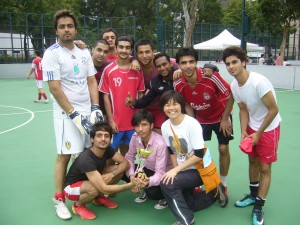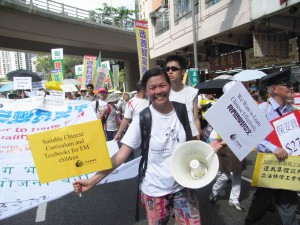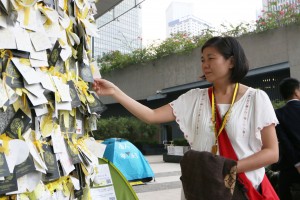Campaigner steps down from Unison after serving ethnic minority communities for 16 years
By Agnes Ng
Sometimes, the surest sign of love is knowing when to let go. For Fermi Wong Wai-fun, setting up and running Unison, Hong Kong’s foremost non-governmental organisation (NGO) advocating for the rights of ethnic minorities, has been a labour of love. Now, after 16 years, Wong has left the organisation in the hope that it can be more effective without her at the helm.
“I have been working non-stop in Unison for 16 years. I am really tired,” Wong says, then stops and tries to mask the hardship with a smile. “I think it is the time for me to let go.”
Wong started her career as a social worker specialising in community work in 1995. In the course of her work, she saw a pressing need for ethnic minorities to get out of poverty and segregation, particularly in schools. “Serving ethnic minorities is not a choice, [it’s that] at that moment you see the need and then you naturally respond,” Wong says.
Wong strongly believes everyone is entitled to dignity regardless of his or her race. “Under everyone’s skin, our bones are white and our blood is red. I cannot see that they [ethnic minorities] are inferior compared with the Chinese-speaking people,” Wong says resolutely.
Wong founded Unison in 2001 with two other partners. “There was not even a single organisation helping the ethnic minorities, so I did it myself,” Wong says.

It was an uphill struggle. For the first three years, there was no funding and the organisation ran on donations. Wong herself depended on handouts. “My sister gave me cash. I cannot remember whether it was $3,000 or $5,000,” Wong says with gratitude. “But I spent most of it on Unison. I did not use much, only for dining and transportation,” she adds.
Apart from the lack of money, Unison also had no office. Wong says she used to meet her clients in neighbourhood cha chaan teng diners. She soon realised this did not work since the diners would charge double if customers only ordered drinks and Wong did not have the money to pay for food every time. Neither was it appropriate to go to parks because they were too exposed for private emotions; sometimes her clients wept when talking about their suffering.
Wong went as far as asking her then boyfriend, now husband, if he could lend her his home in Yuen Long where many ethnic minorities live. Fortunately, her teacher’s friend lent Wong an office space in Mong Kok after hearing about her plight. Once she had an office, she furnished it with items she picked up near a refuse collection point.
“Our lack of resources might affect the scale of our services but it could be overcome,” Wong says. She then “found” clients by doing outreach work among the ethnic minorities. She would start random conversations in parks and offer to help members of the ethnic minorities to find schools and jobs. When they were in trouble with the law, she sometimes bailed them out. Gradually, she built up friendship and trust. Sometimes she even gave the key of her office to teenagers who had nowhere to sleep at night.
Before drug rehabilitation centres started to accept drug users from Nepal, some of them would seek Wong out. “I helped them to quit,” she says. “Actually it was very dangerous and luckily they did not die,” Wong says, describing scenes where drug users would be writhing on the floor suffering from withdrawal symptoms, while she worked at her desk and tried to distract them by chanting sutras.
Her efforts to fight against racism and for social equality have won her acclaim in some quarters and vilification from others. Some have condemned her as a “traitor” for helping the “outsiders” but she does not care about such comments. Wong is not one to yield to pressure. However, she has come to believe that her leadership of Unison has become an impediment to the advancement of the organisation’s work and aims.
This is because she thinks certain government officials and the Education Bureau consider her such a nuisance that they refuse to deal with her. In the past, Wong tried to brush this aside and engage with them. “[I’m] so naïve that I’ll make a point of going up and greeting them,” Wong says. “But it is really heartbreaking. I’m just trying to serve the ethnic minorities and they treat me like this, so does this mean the ethnic minorities aren’t even people in [the officials’ eyes]?”
Wong has been pushing hard for ethnic minority children to be taught in the same classes and schools as ethnic Chinese children and for the introduction of a Chinese as a second language curriculum to help children from non-Chinese speaking families to acquire proficiency.

Although she has succeeded in raising awareness and discussion of these issues, she believes she is unable to make any more headway and that Education Bureau officials will refuse to listen to any requests once they know they come from her. “If my existence hinders the development of the matter, I should leave,” Wong sighs.
Although she feels as though her work with Unison has hit a roadblock, she remains optimistic about the organisation’s future development. Having been in the driving seat for so long she fears she may have developed a blind spot, so a handover may be healthy for the organisation.
And she has had her triumphs. While it has not been easy, Unison’s work has been widely recognised in the community and won her a lot of friends, supporters and comrades. All of which reminds her that Hong Kong is still a place where people can fight for a multicultural society, equality and social justice.
Wong, who arrived as a new immigrant in the early 1980s, is fully aware of the difference between mainland China and Hong Kong. Therefore, she particularly treasures Hong Kong’s values and uniqueness.
As a child, Wong lived in a village in Quanzhou, Fujian. Her father came to Hong Kong to seek a better life in the early 1970s. His wife and four children joined him later. Wong was 11 when she left Fujian.
Before coming to Hong Kong, Wong lived through part of the Cultural Revolution in the Mainland. Although she was young, it left an impression. “When I was small, I just knew you could not speak freely but I did not know why,” she says. One time, she casually asked her mother what Chairman Mao Zedong ate, as he was like a deity in her mind. Irritated by her daughter’s constant barrage of questions, her mother quipped that Chairman Mao ate Premier Zhou Enlai’s faeces.
Wong was shocked, and boasted about her “great discovery” in front of other villagers right in the ancestral hall. The next day, the village head came to her house with other villagers and scolded her mother for not teaching her well. Later, the incident would remind her of the power of words.
Apart from not having freedom of speech, there was no press freedom in the Mainland at that time and so there was very little information beyond officially sanctioned propaganda. There were many myths circulating about Hong Kong.
Wong remembers when she and her family were preparing to make the journey to Hong Kong, people told them that women and girls in Hong Kong all had curly hair so they would immediately be recognised as Mainlanders. So they permed their hair only to discover when they arrived in Hong Kong that it was not true. “We originally wanted to pretend to be Hongkongers but finally we showed that we were Mainlanders,” she laughs. “We believed in anything, even if did not make sense.”
When Wong finally arrived in Hong Kong, what she saw was a city that was completely different to her expectation and imagination. “I had been told that there was gold on the ground for people to pick up in Hong Kong and I asked people if I could collect it,” says Wong, unable to stop laughing at herself as she tells the story.
As one after another myth was knocked down, Wong faced the challenges of being a new immigrant from the Mainland. Wong recalls there was quite a lot of discrimination against Mainlanders at the time. Her primary school teacher scolded her and her mainland classmates nearly every lesson. “I remember that one time my teacher called my name and said ‘Wong Wai-fun, why did you come to Hong Kong?’ and I answered sincerely that I thought we could pick up gold easily in Hong Kong.” After replying, Wong says she was scolded and humiliated by her teacher.
Although the reality did not match her expectations, Wong still cherished the good things in Hong Kong. In the first years, her family settled in the squatter area of Diamond Hill where she found happiness and companionship. “I thought people were very friendly, not like in the Mainland, where I could feel the adults’ fear [of the country],” said Wong. “My parents no longer needed to whisper under the quilt,” Wong says.
Wong was also excited about the sudden onslaught of so much information when she first came to Hong Kong. She did not have money to buy newspapers so she would pick up the newspapers other people had already read or did not want. The easiest one to pick up was Wen Wei Po, the content of which was similar to those that she read in China. However, one day she accidentally picked up Ming Pao and read an article with the headline “Mao Zedong is a devil”. “That was the first time I experienced freedom of speech. From then onwards, I start to read Ming Pao since it is so exciting,” Wong says, smiling at the recollection.

It is these same freedoms, which she has enjoyed since coming to Hong Kong all those years ago, that Wong now wants to defend. After stepping down from Unison, she has not had time to plan her next move as she has thrown herself into supporting the Occupy Movement. Since the occupation began in late September, Wong has been a regular sight at the occupied areas – whether camping out in Admiralty and discussing politics or giving open-air democracy lectures in Mong Kok.
She says she has seen many things that make her angry since the movement started and it may seem the protesters have been unable to wrangle much out of the government. But she has also been inspired by the movement and stresses the importance of holding on to hope. “I’ve seen the good side of humanity [in this movement] and I am very proud to be a Hongkonger,” she says.
Edited by Hilda Lee










































